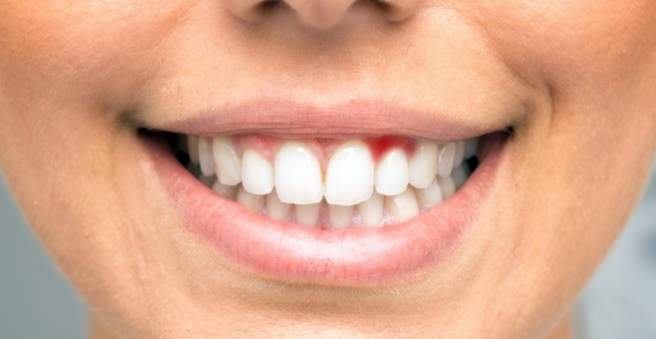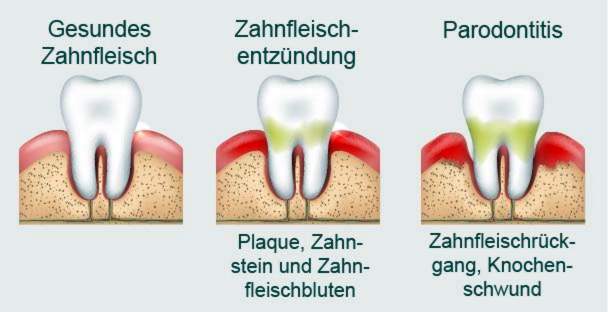Gingivitis is an acute or chronic infection of the gums. It is usually caused by bacteria, more rarely by viruses or fungi. Inflamed gums are almost always due to a lack of dental hygiene. But even a gum injury can cause inflammation. Typical symptoms include swollen, reddened gums and bleeding gums. Read more about the causes, symptoms, treatment and prognosis of gingivitis here!

Quick Overview:
- Description: acute or chronic infection of the gums
- Reason: mostly lack of oral hygiene (with proliferation of bacteria in the mouth), sometimes mechanical irritation / injury in the mouth
- symptoms: Swelling, bleeding, bad breath
- Examination: usually the dentist’s eyesight, possibly also probe and possibly X-ray examination is sufficient
- Treatment: carefully oral hygiene, if necessary cleaning by the dentist
- Forecast: Gingivitis usually heals within a few days. Left untreated, periodontitis and tooth loss threaten.
Gingivitis: causes and risk factors
If you do not clean the teeth thoroughly on a regular basis, gum inflammation can quickly develop. at lack of oral hygiene In fact, pathogens can multiply in the oral cavity. Most common are the bacteria. There are several hundred different species in the mouth. They are part of the natural oral flora and are usually harmless.
But if the teeth are not freed from food leftovers on a regular basis, it is literally a matter of eating for the bacteria – they multiply strongly. The germs together with the leftovers, metabolites and saliva form a soft biofilm on the teeth, the bacterial plaque is called. In this plaque, the bacteria are largely protected from the immune system defense forces.
But that’s not all: when metabolizing food residues, the bacteria produce aggressive acids and toxins (toxins). These penetrate the fine gaps between the tooth and the gums and attack the latter. The immune system responds with an inflammatory reaction – a gingivitis has developed.
If plaque is not brushed off regularly, calcium and other minerals will accumulate in it. The coating becomes firmer and develops into tartar. In its rough structure, the bacteria can settle even easier. In addition, small periodontal pockets (periodontitis) can form.
In addition to lack of oral hygiene can also too intensive brushing your teeth cause a gum inflammation: This can hurt the gums. Bacteria can settle in the wound and cause inflammation.
Various risk factors They are particularly susceptible to gingivitis: These include, for example, metabolic disorders, diabetes mellitus (diabetes), alcohol and nicotine consumption, stress, hormonal changes (puberty, pregnancy, etc.) or a vitamin C deficiency. Certain medicines for convulsive diseases (hydantoin preparations) and high blood pressure (nifedipine preparations) favor gingivitis. The same applies to the active substance cyclosporin A. It inhibits the immune system and is therefore used after organ transplants (for the prevention of rejection reactions) and autoimmune diseases.
Gingivitis: symptoms
Dentists distinguish between one acute and one chronic gingivitis, The former usually arises suddenly and on the gum line. Usually she does not hurt. It is estimated that about 80 percent of adults in this country have gingivitis, but they do not know it.
If the inflammation does not go back for a long time (about a week), it is called chronic. If it attacks the periodontium and causes what is known as periodontitis, the affected person can even fall out of his teeth in severe cases.
A gum infection causes no pain. However, there are other signs of gingivitis: while healthy gums are pink, firmly attached to the tooth and do not bleed, inflammatory symptoms typically appear in the form of the following symptoms:
- Redness and swelling
- Bleeding gums
- soft gums
- halitosis

One particular form of gingivitis is acute necrotizing ulcerative gingivitis (ANUG). In this form, the bacteria attack the gums between the teeth. Ulcers are formed and the gums die. Alarm signals here are sudden strong fever, pain, bad breath and fatigue.
Gingivitis: treatment
Gingivitis usually resolves after a few days if you clean your teeth regularly. If prolonged, you should have your dentist treat gingivitis.
What to do if you have gingivitis? Tips for the home
The most important remedy for gingivitis is daily oral hygiene. Above all, the bacterial deposits must be removed regularly.
Normally, it is enough thoroughly brush your teeth twice a day. This can prevent gingivitis or heal it. You must thoroughly clean all dental surfaces and remove the plaque. Use one for this Toothbrush with softer bristles, This reduces the risk that the inflamed gums injured or additionally irritated when brushing your teeth.
To clean the interdental spaces, you should floss or so-called Interdental brushes use. Finally you can with antibacterial mouthwash solutions gargle or one special ointment Instruct. Both reduce bacterial growth. What also helps are dentist-prescribed formulations based on hydrogen peroxide.
Note: As a precaution, it is also advisable to have the dentist carry out a professional tooth cleaning at least once a year. Because this also reaches the places in the mouth where you can not get with the toothbrush.
Gingivitis: house centerl& Homeopathy
Some people use home remedies for gingivitis to relieve symptoms and reduce inflammation more quickly. For example, you can with Camomile tea gargle. The medicinal plant has anti-inflammatory and mucosal protective properties. Often, too Sage, thyme or myrrh used because of their anti-inflammatory and disinfecting effect.
A good home remedy for gingivitis should also be Apple Cider Vinegar It is recommended to gargle with a mixture of two tablespoons of apple cider vinegar and a glass of water daily for at least half an hour before brushing your teeth. This is supposed to stimulate saliva production and have an anti-inflammatory and antibacterial effect.
Some people who have recurrent gingivitis use homeopathy for gingivitis to aid healing. However, their effectiveness has not yet been scientifically proven.
Alternative healing methods do not replace the classic oral hygiene!
Gingivitis: treatment by the dentist
If thorough brushing and possible home remedies and homeopathy do not eradicate Tahnfleischzündung, you should go to the dentist. He will first clean all tooth surfaces and remove stubborn, inaccessible to the patient pads. With hand instruments and ultrasound equipment, it also reaches deep plaque and can gently remove it. After that, he will gently polish the tooth surfaces. This makes it harder for bacteria to re-attach.
If the gums are severely attacked or gum pockets have formed, the doctor will decide on the appropriate therapy in individual cases.
Gingivitis: examinations and diagnosis
Gingivitis usually recognizes the tooth type with the naked eye. Using a probe, he tests the condition of the gums and checks if gum pockets have formed. This is where bacteria like to settle. Depending on the severity of the inflammation, the gums bleed to varying degrees after being touched by the probe. By means of these examinations the dentist determines the Periodontal Screening Index (PSI), It is used for the early detection of diseases of the periodontium.
If the gum disease has been around for some time, it’s often an extra X-ray of the jaw useful. This helps in finding the cause and possible consequences. With a Examination of saliva The doctor can also determine the types of bacteria in the mouth.
Gingivitis: history and prognosis
The prognosis for gingivitis is generally good. With careful dental care and oral hygiene, it heals in most cases after a few days again. Left untreated, however, gingivitis can become chronic. In the worst case, even a periodontitis, that is an inflammation of the entire periodontium. Over time, the gums give way, the teeth loosen and can fail.
To make sure that it does not get that far, you should pay attention to thorough oral hygiene and regularly go to the dentist to check. So you can one Gingivitis prevent or recognize them early and treat them.